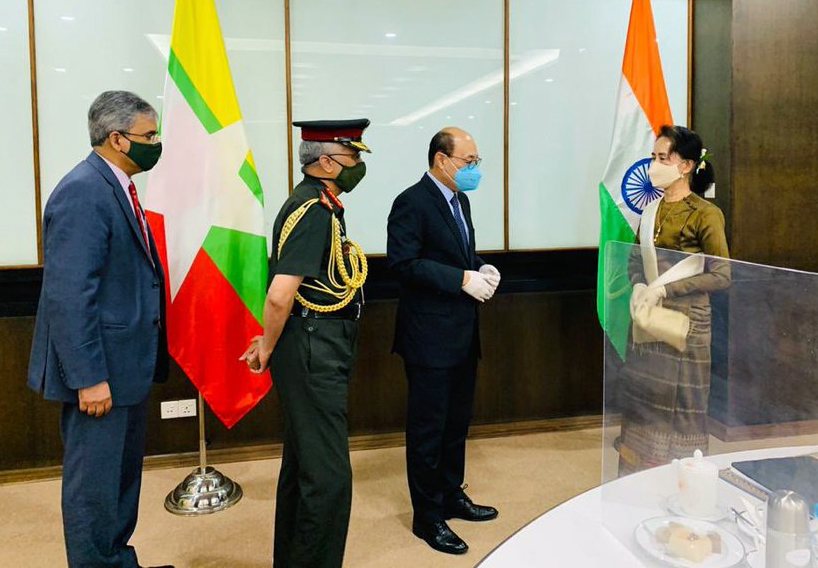It would be unwise to withdraw our ambassador. He could be called for consultations and kept in Delhi for some time, and sent back.
If I were asked to name five most famous women in the world, Aung San Suu Kyi would be number two on the list. Number one would be Queen Elizabeth. Can you think of the other three? Try. No film stars.
She is a Nobel Laureate. “Honours clattered around her like hailstones”, writes Peter Popham, one of her many biographers. The European Parliament awarded her the Sakharov Prize—himself a Nobel Laureate and the Soviet Union’s most famous dissident. Many honorary degrees, freedom of several cities, the Jawaharlal Nehru Peace Award, the international Simon Bolivar Prize, the Olaf Palme Prize, the Congressional Gold Medal and many more.
She spent nearly two decades in jail during various military dictatorships.
The present military dictatorship under General Min Aung Hlaing, dismissed Aung San Suu Kyi’s democratically elected government last Sunday. In the November 2020 elections, her party, National League of Democracy, NLD won 80% of the votes cast. The generals said the elections were seriously flawed (what were they doing for three months) and that she had illegally imported some walkie-talkies. One does not know whether to laugh or cry for Suu Kyi’s cruel fate. For the walkie-talkies she can be sent to jail for three years.
The Ministry of External Affairs said on Monday that it was deeply concerned at the military coup in Myanmar. “We have noted the developments in Myanmar…we believe that the rule of law and the democratic process must be upheld. We are monitoring the situation closely.”
What options does India have? With all our sympathy for Aung San Suu Kyi, we must give national interest top priority. It would be unwise to withdraw our ambassador. He could be called for consultations and kept in Delhi for some time, and sent back. We have relations with several military regimes, several non-democratic countries, China being most prominent. We cannot choose the governments of other countries. We do business with whichever government governs. In some cases, cordiality is replaced by diplomatic caution. Good diplomats are never overzealous. The advice given to French diplomat Talleyrand, perhaps the cleverest diplomat of his country has produced, was, “Above all, gentlemen, not the slightest zeal”.
I have been to Burma/Myanmar twice. The first time with Prime Minister Rajiv Gandhi in 1987. In 2004 I went as External Affairs Minister. One gem from the Rajiv Gandhi meeting with General Ne-Win—President for 28 years—I will relate. The Prime Minister suggested to the General that more Indian tourists should come to Burma and more Burmese to India. “Rajiv, I don’t like tourists. They are a pest. I made the mistake of allowing…to open a tourism office in Rangoon. Soon hundreds of tourists were everywhere a few months later from… They gave my people fancy ideas. I have now decided to close that tourism nuisance.” Rajiv Gandhi was left speechless. So was I.
***
I met Mahendra Singhji Tikait, the father of Shri Rakesh Tikait only once about 40 years back. The senior Tikait once filled the lawns on both sides of Rajpath with lakhs of farmers. He was a born leader.
I once visited him in his village Sisouli in Western Uttar Pradesh. His wife was taking care of cows and buffaloes. He himself was sitting on a khat, smoking his hukka. He said to me that coming from Bharatpur, I was a special guest. “The Jats of Bharatpur were number one Jats.” He asked his wife to serve lunch. Misi roti, fresh homemade butter, several vegetables. All in a thali. I was very touched by his generous hospitality and refined rustiness. I asked him, how often he went out of the village. “Never during sowing and harvesting. When I go out I drive my tractor.”
After lunch he took me to his room on the first floor of his commodious pucca house. “Choudhary Sahib, you now rest. I will go to the fields. I will be back in half an hour.” His kurta and dhoti were of pure khaddar. I don’t remember if he wore a turban or a Gandhi cap. He was over six feet tall. His personality was distinctive. There was no electricity in the village but no one seemed to miss it.
It was time to take leave of my charming large-hearted host. His wife gave me pure butter in a brass contraption.
I had spent a memorable day with a remarkable man, who gave so much and asked for so little. A crowd of several hundred turned up to bid me farewell. Before leaving I asked Mahendra Singhji, “Where is your office? Who keeps your accounts?” “I have no office. My son takes care of accounts.” His final words were, “Chaudhuri Saheb, phoolo or phalo”—prosper and take care of yourself.

